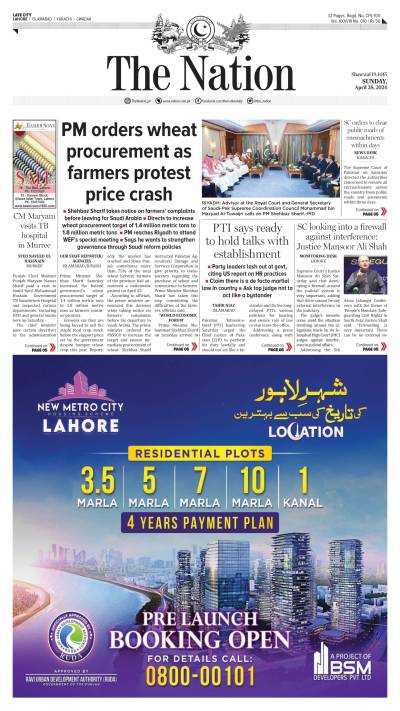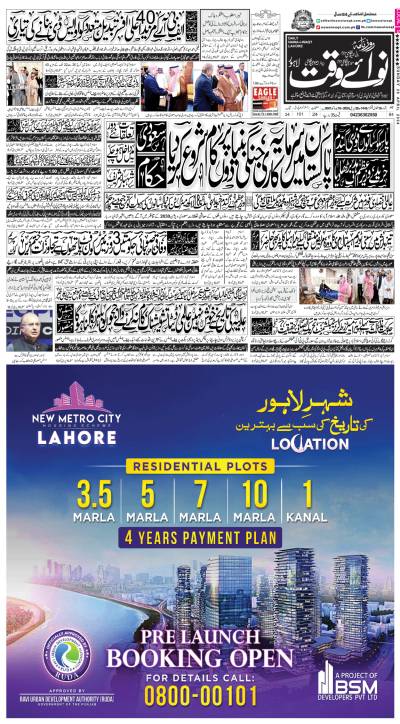FAISALABAD - Ramazan is the ninth month according to lunar calendar. Word Ramazan is derived from root word 'ramida or 'arramad which means intense scorching heat and dryness, especially of the ground. Ramazan, which is pronounced as Ramadan in Arabic language, is called so to indicate heating sensation in stomach as a result of thirst. Others said it is so called because Ramazan scorches out sins as it burns the ground. These views were expressed by scholars belonging to different schools of thought. Some of them said it is called so because hearts and souls are more readily receptive to the admonition and remembrance of Allah during the month, as sand and stones are receptive to the suns heat. They added that it begins after the month of Shaban. In case new moon is not sighted, after 30 days of Shaban, it begins. The month lasts for 29 or 30 days depending on the sighting of the moon. They said that if the moon is sighted on the night of 29th fast, the month of Shawwal begins from the next day and Ramazan concludes. The 1st of Shawwal is Eid day also known as Eidul Fitr to distinguish it from Eidul Azha (Bakri Eid). They said that Ramazan is the month in which the Quran was revealed. The Holy Book clearly says, O you who believe Fasting is prescribed to you as it was prescribed to those before you, that you may learn piety and righteousness. (Al Baqarah, 2:183). Fasting is to be done by all able persons who have reached puberty. They added that if a person is sick or has some medical reason or if a woman is pregnant, they enjoy relaxation in this regard. They said, In recent years a lot of research has been done about the medical benefits of Ramazan. The physiological effect of fasting includes lower of blood sugar, lowering of cholesterol and lowering of the systolic blood pressure. They said In fact fasting would be an ideal recommendation for treatment of mild to moderate, stable, non-insulin diabetes, obesity and essential hypertension. There are psychological effects of fasting as well. There is a peace and tranquility for those who fast during the month. Personal hostility is at a minimum, and crime rate decreases. The Muslims take advice from the Prophet. They quoted the last and final Messenger as saying, If one slanders you or aggresses against you, say I am fasting. They observed that this psychological improvement could be related to better stabilisation of blood glucose during fasting as hypoglycemia after eating, aggravates behavior changes. There is a beneficial effect of extra prayer at night. This not only helps with better utilisation of food but also helps in output, they added. There are 10 extra calories output for each rakat of the prayer. They said that the Muslims do not offer prayers for exercise, but a mild movement of the joints with extra calorie utilisation is a better form of exercise. Similarly, recitation of the Quran not only produces a tranquillity of heart and mind, but improves the memory. There is a beneficial effect of extra prayer at night. This not only helps with better utilisation of food but also helps in output. There are 10 extra calories output for each rakat of the prayer. Again, we do not do prayers for exercise, but a mild movement of the joints with extra calorie utilization is a better form of exercise. Similarly, recitation of the Quran not only produces a tranquillity of heart and mind, but improves the memory. They said that some people think that one month of fasting is too much while others feel that it is only one month where they can get their sins forgiven and get their rewards increased. May Allah bless us all and forgive all our sins and make us good Muslims and good human beings. They said that one of the five pillars of Islam is called Zakat, which concerns the giving of ones money or goods. The word Zakat means both purification and growth. They added that some Muslims have pointed out that pruning plant removes branches which do not produce fruit and encourages new growth. In a similar way, they said, the Muslims often believe that giving through the Zakat will purify them of sin and that God uses it as a test. Zakat consists of giving 2.5 percent share out of ones annual wealth of good equal to prescribed nisab which seven tola gold. The Muslims generally associate Zakat with specifically giving to the poor. They said that Zakat can be distributed among eight categories of people, including those who do not have material possessions or a means of livelihood, those who convert to Islam, those who borrow, those who are fighting for the cause of Allah, or those who are stranded on a journey. They noted that In Islam, Muslim clergymen are generally not paid. There has never been a Levite priesthood that lives off tithes and offerings. While not all aspects of the levitical laws hold true today, the principle of giving is very much part of Christian teaching. Christians have historically been called to give much more money than the Muslims (often 10 per cent or more of their earnings rather than 2.5 per cent). This may also be a challenge for some Muslims who are drawing near to Christ. Talking to this scribe, Maulana Azaam said during Ramazan, the people who fast are not allowed to eat or drink anything from dawn to after sunset. Also one has to restrain other body parts, which may render the fast worthless despite the main factor of hunger. Likewise, tongue must avoid backbiting, slander, and lies and eyes should avoid looking into things considered by the Lawgiver as unlawful. Similarly, ears must stop from listening to prohibited conversation, words, songs, and lyrics that spoil the spirit of fasting and finally restraining of the heart, and mind from indulging, themselves in other things besides zikr or Allah (remembrance of Allah). He said also when one observes fast and feels hunger and thirst he has to remember other people in the world who do not have food and water. Charity is one of the extremely recommended acts during fasting. Muslims are required to give minimum of 2.5% of their annual savings as charity to poor and needy people. Also there are various sayings of the prophet (PBUH) where he has said that any charity made in Ramazan is multiplied up to 70 times. If some people are poor and cannot afford to give money then even a smile is an act of charity.
Monday, April 29, 2024
Significance, benefits of fasting in Ramazan
Lesco detects 75,276 power pilferers in 222 days
7:48 PM | April 28, 2024
PM Shehbaz calls for global health equity, climate resilience at WEF
7:47 PM | April 28, 2024
Foreign Minister Ishaq Dar appointed Pakistan's deputy prime minister
7:46 PM | April 28, 2024
Ashrafi vows to provide best facilities to Hajj pilgrims
7:45 PM | April 28, 2024
Security forces kill two terrorists in DI Khan
7:44 PM | April 28, 2024
Eyes On the PM
April 28, 2024
Track & Trace
April 28, 2024
Solar Siege
April 28, 2024
Political Tightropes
April 27, 2024
Wave of Revolution
April 27, 2024
Border security
April 28, 2024
Cinema – a Catalyst for Change
April 28, 2024
Korangi’s challenge
April 27, 2024
US double standard
April 27, 2024
Political turmoil
April 27, 2024
ePaper - Nawaiwaqt
Advertisement
Nawaiwaqt Group | Copyright © 2024





